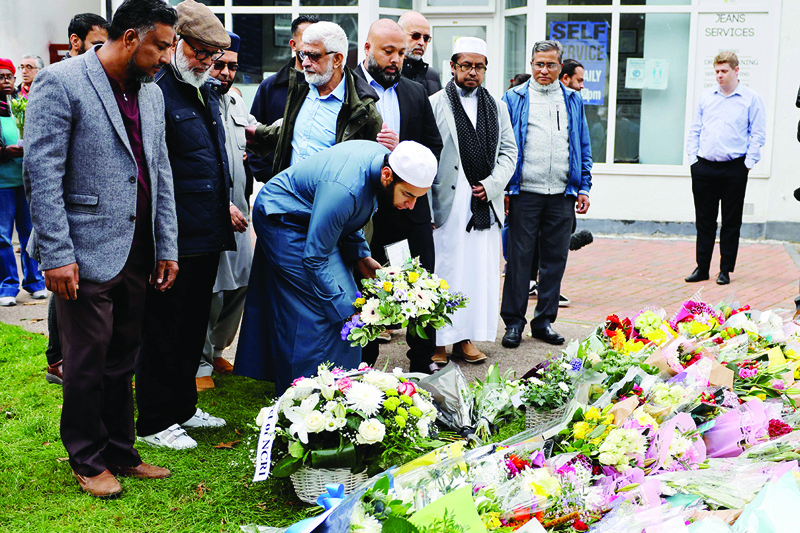 LEIGH-ON-SEA: Members of the Muslim community lay floral tributes at the scene of the fatal stabbing of Conservative British lawmaker David Amess at Belfairs Methodist Church in this district of Southend-on-Sea in southeast England yesterday. - AFP
LEIGH-ON-SEA: Members of the Muslim community lay floral tributes at the scene of the fatal stabbing of Conservative British lawmaker David Amess at Belfairs Methodist Church in this district of Southend-on-Sea in southeast England yesterday. - AFP
LEIGH-ON-SEA, United Kingdom: The fatal stabbing of British lawmaker David Amess was a terrorist incident with possible links to Islamist extremism, police said yesterday, as the government ordered a review of safety measures to protect MPs. Veteran Conservative MP David Amess, 69, was talking with voters at a church in the small town of Leigh-on-Sea east of London when he was stabbed to death on Friday.
Police said they arrested a 25-year-old suspect and were investigating "a potential motivation linked to Islamist extremism". The fatal stabbing has "been declared as a terrorist incident, with the investigation being led by Counter Terrorism Policing", the police said in a statement, adding that the investigation is in the "very early stages".
Multiple UK media outlets, citing sources, reported that the suspect was believed to be a British national with Somali heritage. The Sun tabloid reported that the attacker stabbed Amess multiple times in the presence of two women staff, before sitting down and waiting for police to arrive. Police said they believed the attacker acted alone and they carried out searches at two addresses in the London area.
Prime Minister Boris Johnson visited the crime scene to pay his respects yesterday, laying floral wreaths outside the church with the leader of the opposition, Labour leader Keir Starmer in a rare show of unity. Johnson tweeted a photo of the note he left calling Amess, MP for Southend West since 1997, a "fine parliamentarian and a much loved colleague and friend".
Local residents including members of the Muslim community also came, heaping bouquets next to the police tape. Britain's politicians were stunned by the highly public attack, which recalled the murder of a pro-EU lawmaker ahead of the Brexit referendum. In June 2016, Labour MP Jo Cox was killed by a far-right extremist, prompting demands for action against what lawmakers said was "a rising tide" of public abuse and threats against elected representatives.
Home Secretary Priti Patel on Friday ordered police across the country to review security arrangements for all 650 MPs. "We will carry on... We live in an open society, a democracy. We cannot be cowed by any individual," she told journalists after laying a wreath for her fellow Essex MP.
House of Commons Speaker Lindsay Hoyle promised no "knee-jerk reactions" but told Sky News: "We will take further measures if we need to". Tobias Ellwood, a Conservative MP who tried to save a stabbed police officer during a 2017 terror attack near the Houses of Parliament, on Twitter urged "a temporary pause in face-to-face meetings" until the security review is complete.
Labour MP Harriet Harman also urged greater protection for MPs, telling the BBC: "We cannot have the death of an MP being a price worth paying for our democracy." Conservative MP David Davis, however, told Sky News that pausing meetings with constituents "would be the wrong thing to do", calling them "critical to the operation of British democracy".
MPs and their staff have been attacked before, although it is rare. But their safety was thrown into sharp focus by Brexit, which stoked deep political divisions and has led to often angry, partisan rhetoric. Cox's killer repeatedly shouted "Britain first" before shooting and stabbing the 41-year-old MP outside her constituency meeting near Leeds, northern England.
Amess was at the other end of the political spectrum and backed Brexit. A specialist police unit set up to investigate threats against MPs in the aftermath said 678 crimes against lawmakers were reported between 2016 and 2020. Most (582) were for malicious communications, although other crimes included harassment (46), terrorism (nine), threats (seven), and common assault (three).
Separate figures indicated a sharp rise in reports since 2018, including three threats to kill. Amess himself wrote about public harassment and online abuse in his book "Ayes & Ears: A Survivor's Guide to Westminster", published last year. "These increasing attacks have rather spoilt the great British tradition of the people openly meeting their elected politicians," he said.
MPs have had to install security cameras and only meet constituents by appointment, he added. Unlike some MPs, Amess publicized meeting times for constituents on Twitter and held them in public places, while asking people to book ahead. - AFP
.jpg)









